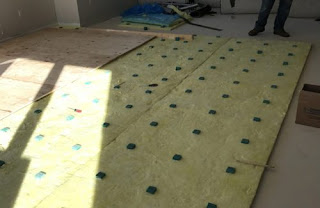Insulation necessary for soundproofing
Soundproofing is an advanced science on its own. There is much more to it than just applying dense muffing materials. For one thing, though you might want a room soundproofed, so that no sound enters or escapes, you don’t want to distort or deaden the sounds in the room.
In private rooms, there are generally two reasons for soundproofing. The first is to enhance the sound in a room, for example in a home theatre or a music room. This implies insulating against reverberation and echo by using outdoor vinyl curtains.
The second reason is to create a barrier to keep the sound in the room or to eliminate it from a room. These would be such sounds as dogs barking or traffic noises from outside. Or you might have to confine loud pop music of teenagers to one room or part of the house, or to create a barrier against voices and sounds from neighboring apartments or suites through thin walls by installing ceiling sound panels.
In an average home, acoustics are not important in the TV entertainment room or music room. You just want good quality sound without reverberations or distortions. For that you may install putty pads.
Walls require different kinds of treatments, depending on the materials they are made of. Possibly the best option to go for is a false wall. This is made of laminated panels of well insulated materials that are fastened on the existing wall. These come in different densities to suit your requirements. Other options are leaving an insulated gap, then fit bookcases or cupboards or other built-in furnishings against the wall.
Dense curtains and double glass panes adhere to Noise Control Ordinance Law and generally do the trick for doors and windows can be soundproofed with additional panels of insulating materials or even dense fabric.




Comments
Post a Comment